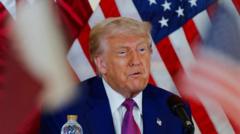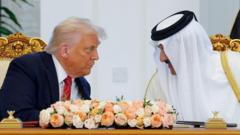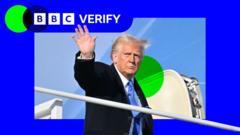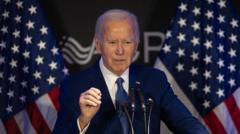As Canada heads to the polls for a crucial election, the race has transformed dramatically with President Trump's trade war and calls for Canada to become the 51st state shaping voter sentiment. Mark Carney's Liberal Party has gained ground against a previously dominant Conservative Party led by Pierre Poilievre, as Canadians weigh their options at this turning point in the nation's political history.
Canada Faces Pivotal Election Amid Trump's Influence and Economic Uncertainty

Canada Faces Pivotal Election Amid Trump's Influence and Economic Uncertainty
The Canadian election, taking place amidst President Trump's looming threats and a shifting political landscape, sees the Liberal Party led by Mark Carney facing off against Conservative leader Pierre Poilievre.
Canadians are casting ballots today in an election that holds significant implications for the country’s political landscape, particularly in light of the ongoing trade war initiated by President Trump and his controversial assertions about Canada joining the United States as the "51st state."
Once favored to secure a decisive victory, the Conservative Party, under Pierre Poilievre, has seen a notable shift in momentum as recent polling indicates a rising Liberal Party led by Mark Carney, who has been at the helm since taking over from Justin Trudeau last month. The election, described as deeply consequential, will determine not only the next Prime Minister but also how Canada responds to external pressures and economic challenges.
In the lead-up to this election, Carney has focused on positioning himself as an anti-Trump, hoping to sway voters concerned about the implications of U.S. tariffs and Trump’s sovereignty threats. His background as a former central banker underscores his economic skills, aiming to reassure Canadians of his capability to navigate through these turbulent waters. Voter perceptions of his leadership have notably changed following Trudeau's resignation and political upheaval in recent months.
Conversely, Poilievre's candidacy has been marked by his populist rhetoric and calls for reduced government intervention. However, his political alignment and stylistic similarities to Trump have alienated some voters who perceive him as an extension of the controversial U.S. president. Critics argue that being associated with Trump amid his ongoing attacks on Canadian sovereignty has put the Conservative Party at a disadvantage, drawing scrutiny from moderate voters, particularly in essential provinces like Ontario and Quebec.
In addition to the two main contenders, smaller parties such as the New Democratic Party (NDP) and the Greens also seek to secure seats, albeit with limited expectation of significant power. The landscape of this election is further complicated by rising anti-immigrant sentiments and economic concerns, with many voters prioritizing soaring living costs and inflation in their decision-making process.
As polling stations throughout Canada prepare to close this evening at 9:30 p.m. Eastern Time, worries about the economic future and sovereignty under Trump's influence loom large in the minds of many voters. With nearly 7.2 million Canadians reported to have already voted during advance polling, the result of this election will provide a clear indication of whether the Liberal resurgence can maintain momentum against the Conservative Party’s aspirations or if Poilievre can leverage his base to shift the political tide back in his favor. The election results are expected to emerge late tonight, paving the way for Canada's political future in a time of uncertainty.





















